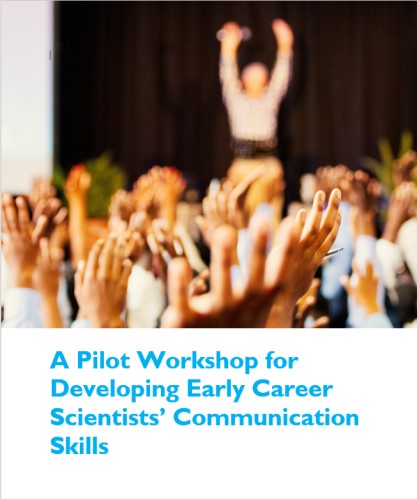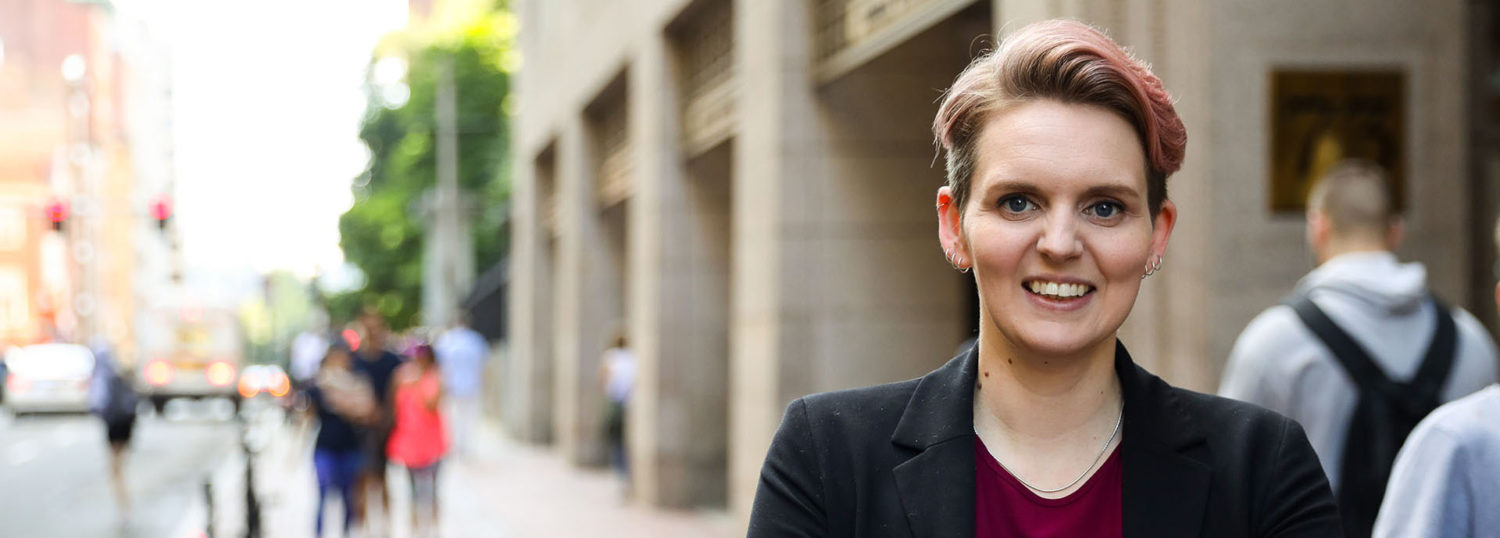[I’m about to emulate those recipe blogs I hate by giving you an entire personal backstory before finally giving the details of the report. If you want to skip that — and I don’t blame you — you can find the report right here.]
ser – end – dip – i – ty
noun
The occurrence and development of events by chance in a happy or beneficial way.
Serendipity. I met my colleague, Dr. Hayley Schiebel, by chance. We were “backstage” at our institution’s 2018 commencement event, sweating in our academia regalia, and happened to line up near each other. Someone introduced us — I don’t remember who — and we struck up conversation, soon discovering that we shared an interest in effective science communication. She eagerly described her wish to put together some sort of training workshop for early-career scientists, and I wanted to be involved, even though I didn’t really have any experience or skills in that area. I did have one asset, though: I. Knew. People. I knew people who could help us.
Serendipity. I met Dr. Jessamyn Fairfield through a video game. Jessamyn was the Guild Master (GM) of my World of Warcraft guild when we were both in graduate school — Criminal Justice at Michigan State for me, Physics at the University of Pennsylvania for her. After graduating, I moved out to Massachusetts and Jessamyn move to Ireland. Our time in World of Warcraft dropped off, but we stayed in touch and eventually met in person on one of Jessamyn’s visits back to the U.S. I knew that Jessamyn was deeply involved in science communication activities in Ireland, including Soapbox Science and Bright Club, and that she had even won a prestigious Institute of Physics award for exceptional early career contributions to public engagement.
Serendipity. I met Dr. Echo Rivera when we were both graduate students at Michigan State. Echo was in the Community Psychology program and was heading up data collection on a project that involved interviewing survivors of intimate partner violence, and I worked as an interviewer on that project. I was so impressed by Echo: here we were, at similar places in our graduate training, and she was managing a team of research assistants while I felt I could barely tie my shoes each morning. We lost touch after that project but reconnected a few years later, when Echo was working in evaluation research and had started her own presentation design training company, Creative Research Communications. Eager to improve my own communications skills so that I could be a more effective instructor, I took her Blast Off to Stellar Slides class and absolutely loved it.
So there’s the skill I bring to this endeavor: I have awesome friends and know how to use them.
 After our chance meeting at commencement, Hayley and I contacted Jessamyn and Echo to develop a science communication training that could be delivered in a single day pre-conference workshop. We successfully applied for NSF funding to support this pilot project. As an atmospheric and ocean chemist, Hayley attended the annual ASLO and OSM conferences and was able to secure time for us to pilot the workshop there, as well as coordinate food and technology services. Echo and Jessamyn created training modules based on their areas of expertise and, with their input, I created pre- and post-workshop evaluation surveys, as well as smaller surveys to administer after each of Echo’s presentation design sessions.
After our chance meeting at commencement, Hayley and I contacted Jessamyn and Echo to develop a science communication training that could be delivered in a single day pre-conference workshop. We successfully applied for NSF funding to support this pilot project. As an atmospheric and ocean chemist, Hayley attended the annual ASLO and OSM conferences and was able to secure time for us to pilot the workshop there, as well as coordinate food and technology services. Echo and Jessamyn created training modules based on their areas of expertise and, with their input, I created pre- and post-workshop evaluation surveys, as well as smaller surveys to administer after each of Echo’s presentation design sessions.
We conducted our first pilot workshop at the ASLO 2019 meeting in Puerto Rico and had great success. After analyzing the evaluation data from the 2019 workshop, we made some small adjustments to our workshop content and conducted another pilot workshop at the OSM 2020 meeting in San Diego.
Our new report, “A Pilot Workshop for Developing Early Career Scientists’ Communication Skills“ describes our goals in creating this training workshop, the results of our workshop evaluation, and our thoughts about moving forward. We are deeply grateful to the NSF for supporting this project and to ASLO and OSM for hosting us. We also appreciate our workshop participants who brought their energy and enthusiasm to a long day of training simply because they want to be better science communicators. You’re all going to change the world, I know it.
Finally, I want to take just one more moment to point out that this experience underlines one of my biggest pieces of advice about graduate school and academic careers: have hobbies and interests outside your discipline. I didn’t bond with Hayley, Jessamyn, or Echo because of my specific disciplinary interests. I met Jessamyn because I played video games, something that is typically dismissed as a distraction and waste of time. I met Echo through a research project, sure, but we ended up being friends because we were both interested in dog training (Cerberus says hi, Biscuit!), my other graduate school “distraction.” And although I met Hayley in a professional context, we would not have met and teamed up had we not been at a general university event and seen the strength in this transdisciplinary partnership. We spent a lot of time in graduate and early career training talking up the value of networking, networking, networking and people often talk about how much they hate it, but I want to tell you that networking doesn’t always mean schmoozing at conferences and deliberately ingratiating yourself to more senior researchers. Networking can just mean being a whole person with varied interests who is open to striking up a conversation. You never know who you might meet or what will happen, so try to make room in your life for some serendipity.
